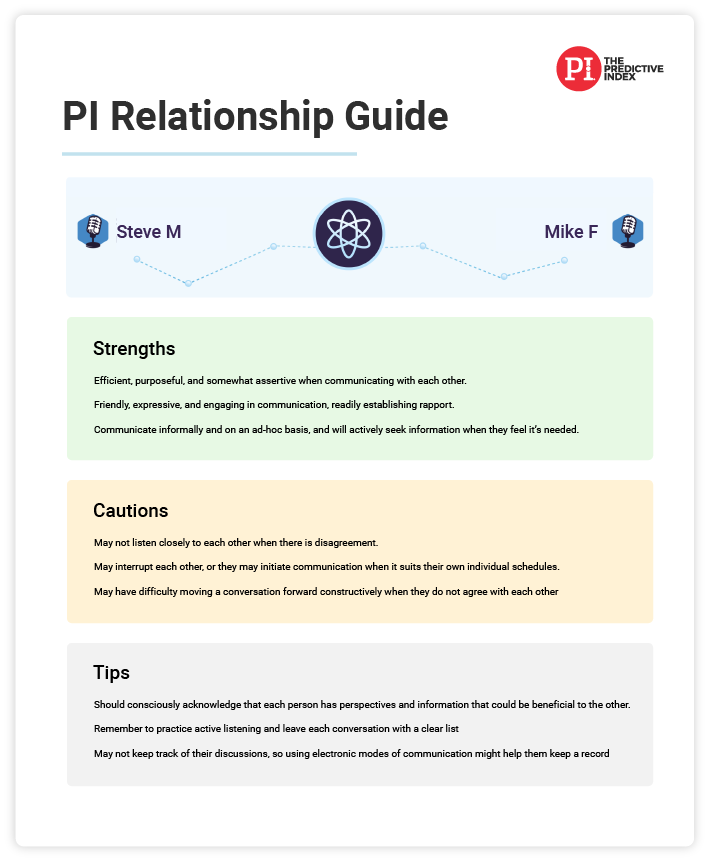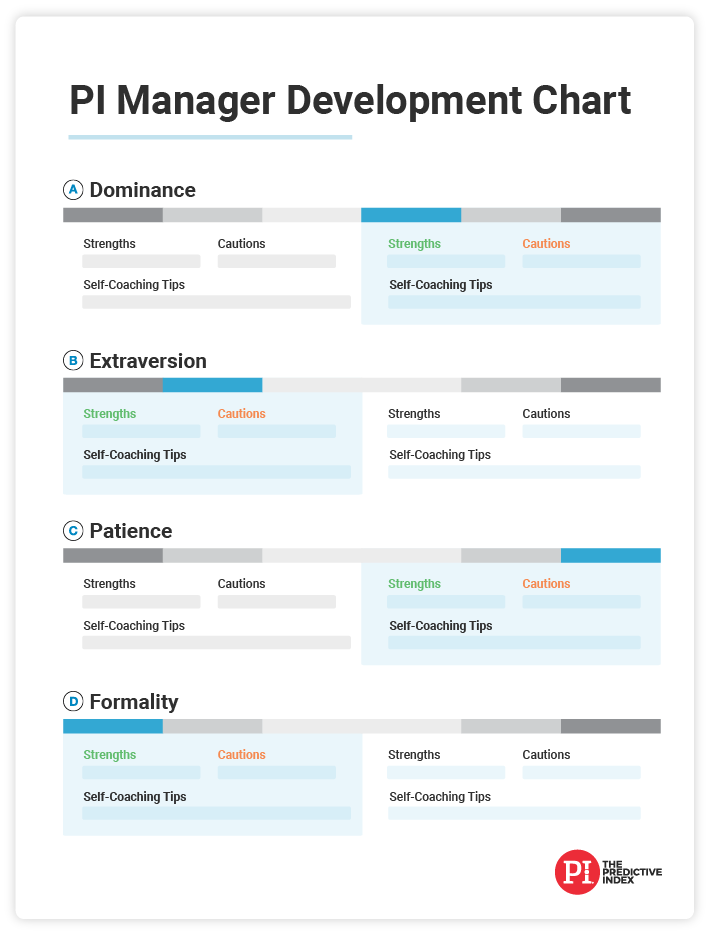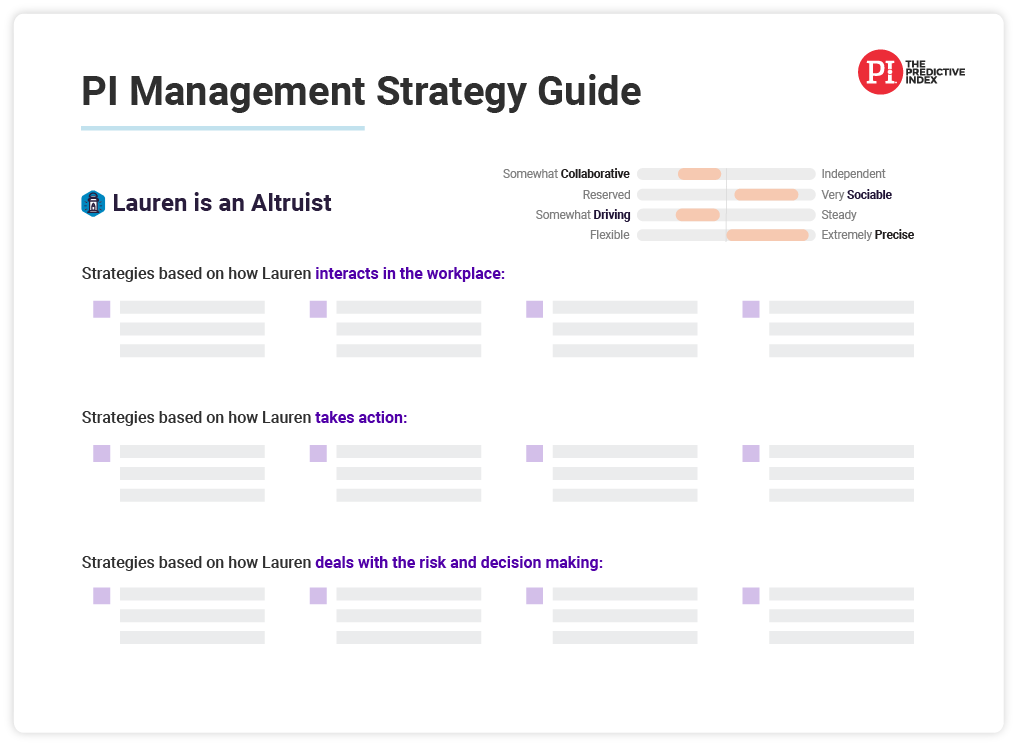
HOT TOPIC: BECOME A BETTER MANAGER
In this newsletter, we take a look at how the PI Behavioral Assessment can be used as a management tool. Not only does it help managers understand themselves and how their natural style might impact others, it can also help them motivate each of their team members in the most effective way according to their individual drives and needs. On top of that, managers can use their understanding of different behavioural styles and motivational drives to resolve or even prevent friction between individuals on their team who don’t see eye to eye.
Self-Awareness: The Key to Leadership Success
Many studies show that self-awareness is one of the most important qualities in successful managers. According to author Anthony Tjan, “there is one quality that trumps all, evident in virtually every great entrepreneur, manager, and leader. That quality is self-awareness. The best thing leaders can do to improve their effectiveness is to become more aware of what motivates them and their decision-making.” In his HBR article How Leaders Become Self-Aware, Tjan recommends taking three steps to increase self-awareness: First, test yourself. Tjan recommends several assessment instruments, including The PI Behavioral Assessment, as being helpful in facilitating self-reflection. The PI BA evaluates behaviour, using behavioural science. The personal insight gained will likely be validating, and will provide an objective outside view that may be enlightening and thought-provoking. Next, watch yourself and learn. He also recommends leaders write down the reasons behind key decisions; then, after implementation, reflect and assess the outcomes. Paying regular attention to this second step avoids the “backward rationalisation” many fall prey to. Finally, be aware of others. Observing other people’s strengths will serve to inform the self-aware leader about what they do well, and will help them appreciate and value the different approaches brought by others. Here, too, the insights from the PI profile can provide a framework for observation and learning.
Free PI Introduction to Your Managers
We would like to help you educate your manageres so you can get even more out of your PI license. Therefore, our Managing Partner, Jesper Præstensgaard, can host a 1-hour inspiring presentation for your managers, free of charge. With his extensive experience with PI as a leadership tool, Jesper can share tangible examples of how leaders can benefit from PI. This presentation will hopefully help to embed PI among your leaders and thus increase their engagement to expand the use of PI throughout your organisation, ensuring that you get even more value from your PI subscription. Reach out to your PI consultant to learn more.
Workshops for Managers
Invest in your people and accelerate your business results by sending your managers on a Humanostics workshop. They will gain a fundamental understanding of how to interpret PI assessment results and how to help their employees to feel seen and heard, increasing job satisfaction, retention, and overall organisational stability. They will learn the value of using PI to hire the right employees. The training will turn your managers into leaders by helping them understand their own strengths and areas for improvement. It provides them with data and tools to lead more effectively, resulting in increased self-awareness, improved people skills, and better one-on-one relationships. Training is offered in different formats, virtually and face-to-face. Reach out to your PI consultant to learn more about the options.
Resolve Conflict Between Two Team Members
Have you ever managed two employees who just don’t see eye to eye? Employee conflict can lead to decreased motivation, trust, and performance on a team. The PI Relationship Guide is a tool designed specifically to mediate these conversations. Through awareness of employees’ communication styles, strengths, cautions, and blockers, this guide can help you form better, more effective working relationships while minimising personal squabbles. Download the Relationship Guide for the two individuals and set up a meeting with them both. Here’s a general framework for this conversation: Start with Relationship Strengths – Open the conversation by exploring the strengths that the two recognise in each other. Move on to Relationship Cautions.

Ask each employee to describe the conflict at hand without interrupting each other. If the conflict aligns with any of the cautions listed on the Relationship Guide, let the employees know that the conflict arose from a difference in their natural behaviours – this often provides a sense of relief. Give Relationship Tips – Using what you learned in the session and what you already know about the two employees, facilitate a conversation that explores actions they can each take based on the Relationship Tips section of the Relationship Guide. Remember that Relationship Strengths can be leveraged while planning these actions!
PI Software Pro-Tip: Invite By Link
If your organisation is relatively new to PI, and you do not have behavioural assessments for all your managers or the members of their teams, you can easily ask them to complete the BA by creating an open invitation link. You will not have to create each person individually, and you can even set up the link to automatically send the Behavioral Report to the assessment taker upon completion (we strongly recommend that a certified PI Practitioner give them a verbal feedback as well). To create an open invitation link, go to the assessment center in the Browse menu or click ‘Send Assessments’ in the top right corner. Choose ‘Invite by Link’, click ‘Create New Invitation Link’ and enter the name and description of your link. Choose Employee as the type, select the folder the BA’s should be stored in, choose whether you want to be notified when someone uses the link to take the BA, and select the default language (the assessment taker can always choose between the 68 languages before starting the assessment).
KNOW THYSELF
Whether you’re a first time manager or one with years of experience, PI’s Manager Development Chart provides you with actionable insights based on your behavioural drives. The chart includes a description of your natural strengths or “super powers” and your caution areas or your “kryptonite” to consider as a manager. Consider how you can use your natural strengths to be the most effective manager. When reading through the caution areas, some of them may not immediately resonate with you, but they may still reflect how you are perceived by others so they are still worth considering. The development chart also contains self-coaching tips provided to help you balance your most naturally occurring behavioural style in a variety of situations. Download the chart from your Person Page in PI Software.
APPLY THE RIGHT MANAGEMENT STYLE
When managers tailor the way they coach, motivate, and give feedback based on individual behavioural needs, it leads to better relationships—and better results. A common pitfall for managers is thinking, “If I treat everyone how I want to be treated, I’ll be a great manager.” PI’s Management Strategy Guide gives managers custom insights into how to manage others the way they want to be managed— no guesswork involved. The guide identifies what management strategies will enable individuals to thrive, based on their behavioural preferences for workplace interactions, how they take action, respond to risk, and make decisions. The Management Strategy Guide is an excellent discussion point for 1:1 meetings with your team members. You can go through each suggestion and discuss how important this is to the individual in question, and how you are doing in terms of providing them with what they need in order to be most engaged, happy and productive.



